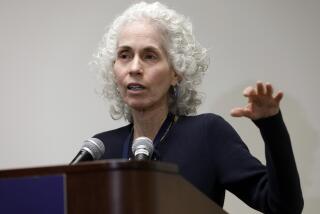U.S. to Press Hospitals on Emergency Care
- Share via
WASHINGTON — Hospitals can’t delay or deny emergency room care just because a patient’s health insurance plan requires permission before treatment, government regulators are ready to announce this week.
A 1986 law bars hospital emergency rooms from refusing to examine and stabilize patients who can’t pay. Now federal officials will use the “patient dumping” prohibition to ensure immediate care whether or not insurance pays.
“Despite the terms of any managed care agreements . . . federal law requires that stabilizing medical treatment be provided in an emergency,” Inspector General June Gibbs Brown of the Health and Human Services Department said.
The 1986 law was intended mainly to protect people without health insurance. However, delays while emergency room staff consult with health plans to see if insurance will pay are on the rise, regulators say.
In some cases, federal officials say, patients with potentially serious health conditions have left emergency rooms after being questioned about their insurance.
To deter such incidents, the U.S. government will begin applying the patient dumping law, which carries fines of up to $50,000 per incident.
Kings County Hospital in Brooklyn, N.Y., is among those already warned to correct delays regulators say may have been caused by attempts to ensure health payment.
American Hospital Assn. spokesman Rick Wade said clarification in the law is welcome. But, he said, “it’s not going to solve the problem of some plans deciding that they’ll use preauthorization rules as a way not to pay hospitals.”
It has become more common for HMOs and other health plans to control costs by refusing to pay unless patients first get permission from designated doctors.
Plans that cover elderly, disabled and low-income Americans in government health insurance programs such as Medicare or Medicaid must waive such requirements for emergency care in situations a “prudent layperson” would judge to be a medical crisis, such as having symptoms of a heart attack. Congress this year considered imposing similar laws on the private sector, but gridlock in the Senate stopped the legislation.
Karen Ignagni, president of the American Assn. of Health Plans, said the group’s members, which include insurers covering 150 million Americans, already voluntarily use the “prudent layperson” standard. “Our plans want to make sure our beneficiaries know that if they reasonably believe they need to go to the emergency room, they should go.”
However, gray areas abound when health plans won’t pay for emergency care and hospitals get stuck with the bill. Many plans will not pay if parents take a feverish baby to the hospital without first calling their pediatrician to make sure an emergency room visit is necessary.
“We want to make sure patients are seeking care in the most appropriate setting,” Ignagni said. That means not going to the hospital “just because it’s the most convenient place to seek treatment on a weekend or after hours.”
More to Read
Sign up for Essential California
The most important California stories and recommendations in your inbox every morning.
You may occasionally receive promotional content from the Los Angeles Times.










